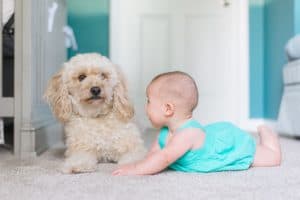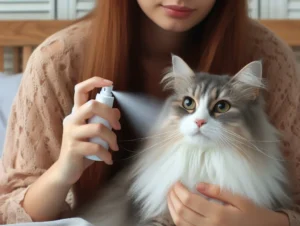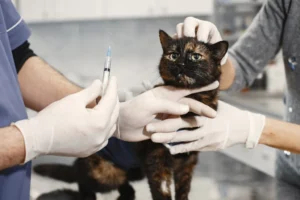Cats are not just cute and cuddly companions; they can also be beneficial for babies in more ways than one. If you’ve been considering adding a feline friend to your family, you might be pleasantly surprised by the positive impact they can have on your little one’s development.
Boosts Immune System
Are you ready for a surprising fact about cats and babies? Having a feline friend around can actually boost your little one’s immune system! How, you ask? Well, cats are like little allergen and bacteria factories (in a good way)! When your baby interacts with a cat, they are exposed to various allergens and bacteria, which can help strengthen their immune system over time. This exposure can potentially reduce the risk of developing allergies and asthma later in life. So, having a cat in the house isn’t just cute and cuddly; it’s also a great way to keep your baby healthy!
And here’s an extra nugget of information for you: studies have shown that babies who grow up in households with cats tend to have fewer respiratory infections and ear infections compared to those without cat companions. So, it’s not just about the fluff and purrs; it’s about giving your baby’s immune system a little boost too!
Emotional Support
Your baby’s emotional well-being is just as important as their physical health. Enter the loving and comforting presence of a cat. Cats have a magical way of providing emotional support and companionship that can be incredibly beneficial for babies. The gentle purring, the soft fur to cuddle with, and the soothing presence of a cat can help your little one feel secure and loved.
Imagine this: your baby is having a rough day, but as soon as they snuggle up with their furry feline friend, a sense of calm washes over them. The bond between a baby and a cat can be truly heartwarming and can help foster a sense of security and emotional stability in your little one. So, not only do cats make adorable playmates, but they also make fantastic emotional support companions for babies.
Encourages Responsibility
Owning a cat can help babies develop a sense of responsibility and empathy. By caring for another living being, babies learn the importance of nurturing and looking after someone other than themselves. Feeding the cat, ensuring it has water, and spending time playing with it can all teach babies valuable life skills. This interaction can foster a sense of accountability and teach them how to be gentle and compassionate towards animals, laying a foundation for responsible behavior as they grow.
Cognitive Development
Interacting with a cat can have a positive impact on a baby’s cognitive development. The sensory stimulation from petting a cat’s fur or hearing its purring can enhance a baby’s sensory processing skills. This can help improve their coordination, as they learn to touch and feel different textures. Furthermore, engaging with a cat encourages social interaction, as babies learn to communicate nonverbally with the pet. This social engagement can aid in the development of language skills and emotional intelligence. Additionally, observing a cat’s behavior can teach babies about cause and effect, as they learn that their actions can have an impact on the cat’s responses.
Additional Insight:
– Enhanced Immune System: Studies have shown that babies who are exposed to cats early in life may have a reduced risk of developing allergies and asthma later on. This exposure to pet dander and other allergens can help strengthen the baby’s immune system, potentially leading to better overall health outcomes.
Stress Relief
Having a cat in the home can be a purr-fect way to reduce stress for both babies and parents. Cats are known for their calming presence, and studies have shown that interacting with a cat can lower cortisol levels, the stress hormone, in both children and adults. So, if you’re looking to create a serene environment for your little one, a furry feline friend might just do the trick.
Social Skills
Not only are cats great stress relievers, but they can also help babies develop important social skills. By interacting with a cat, babies learn valuable lessons in empathy, communication, and responsibility. They learn to interpret non-verbal cues, such as a cat’s body language, and practice gentle touch and kindness. These interactions can lay a strong foundation for building relationships with humans and animals alike.
- Responsibility: Caring for a pet cat can teach babies about the importance of responsibility and routine.
- Communication: Talking to and interacting with a cat can help babies develop their communication skills.
- Empathy: Understanding a cat’s needs and emotions can foster empathy and compassion in babies.
- Companionship: Cats can provide loyal companionship, offering comfort and security to babies.
- Creativity: Playing with a cat can spark creativity and imagination in babies.
Remember, introducing a cat into your home should be done carefully and with consideration for both the pet and the baby. Always supervise interactions, teach gentle handling, and provide a safe environment for both your little one and your furry friend. With proper care and attention, the bond between your baby and their feline companion can be a source of joy and learning for years to come.
Safety Awareness
Owning a cat can be a great way to teach babies about safety awareness and boundaries. By observing how cats interact with their environment and learning to respect their space, babies can develop a healthy respect for animals. Cats have their own way of communicating when they are feeling comfortable or uncomfortable, which can help babies understand the importance of reading body language and cues. This early exposure to animal behavior can be invaluable in promoting empathy and understanding towards other living beings.
Fun Facts
Did you know that babies who grow up with cats are less likely to develop allergies later in life? This is because early exposure to pet dander can help build a stronger immune system. Additionally, cats can provide comfort and companionship to babies, helping them feel safe and secure. Studies have shown that children who have pets tend to have higher self-esteem and social skills. The bond between a cat and a baby can be truly special, fostering love and companionship that will last a lifetime.
- Cats have a calming presence that can help soothe fussy babies.
- Baby’s interaction with a cat can help develop their sensory and motor skills.
- Owning a cat can teach babies responsibility and empathy towards animals.
- Introducing a cat to a baby can help create a harmonious and loving home environment for the whole family.
Remember, always supervise the interaction between your baby and your cat to ensure a safe and positive experience for both.
Alex, a passionate animal lover, has experience in training and understanding animal behavior. As a proud pet parent to two dogs and three cats, he founded AnimalReport.net to share insights from animal experts and expand his knowledge of the animal kingdom.









